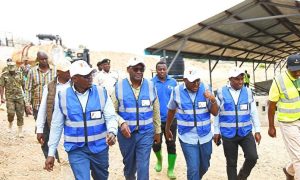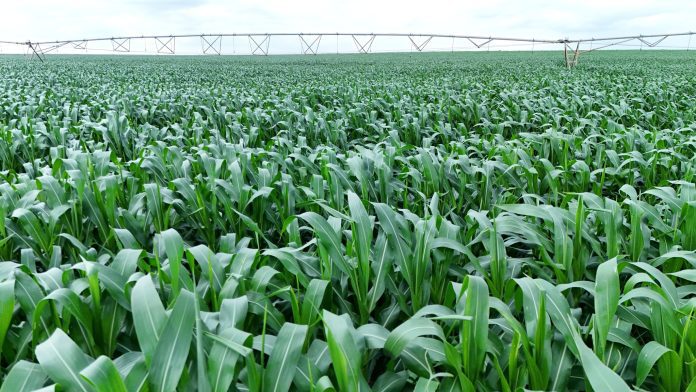The government has ramped up efforts to make Kenya food-sufficient through the Galana-Kulalu Food Security Project, now boosted by a Sh12.5 billion private investment under a Public-Private Partnership (PPP) arrangement model.
Spanning 1.5 million acres across Kilifi and Tana River counties, the project is set to transform the country’s agricultural landscape, boosting food production, creating jobs, improving livelihoods, and fuelling agro-based industries with a steady supply of raw materials.
Funded by Sh519 million from the National Treasury, the National Irrigation Authority (NIA) has already built a 600,000m³ water reservoir capable of irrigating 10,000 acres, an achievement that drew SELU Limited’s massive Sh12.5 billion injection into the project.
Principal Secretaries Dr. Chris Kiptoo (National Treasury) and Eng. Ephantus Kimotho (Irrigation) recently toured the site to assess progress.
Kiptoo confirmed that they have agreed that SELU will initially put 20,000 acres through the Sh12.5B investment.
“The estimate is that if you put all these 20,000 acres under maize, every year they will be producing 70 bags per acre, which translates to about 1.4 million bags per year,” explained Dr. Kiptoo.
“If you sell at the current market price of Sh4,000, that translates to Sh5.6 billion per year. Clearly, that is a good income, and this is a PPP project,” he added.
The PS further noted that the project exemplified how to manage the current economic situation amid diminishing fiscal space, where the government cannot finance projects through the national budget.
He explained that the government has other obligations like financing education, health, and repayment of debts.
“We are increasingly asking for the use of PPP where projects are commercially viable, and clearly this is an example of a commercially viable project,” stated the PS.
Leveraging the 1.5 million acres available in the Galana-Kulalu, Dr. Kiptoo said the country’s food security will improve, resulting in a reduction of imports, thus reducing the need for foreign exchange, and an improvement of income for farmers in the area.
The New Firm Controlling the Multi-Billion Galana Kulalu Food Project
He further disclosed that other investments have been lined up, including the construction of the Galana Dam that will cost Sh35 billion and for which a contractor has already been identified.
“We at the National Treasury are working with the Ministry of Water and are making arrangements to ensure that the project starts as soon as possible,” assured the PS.
He went on: “Once the Sh35B water project is in place, it will generate a sufficient amount of water to attract more investors and encourage other government agencies to invest in this region. This is really the way to go.”
The PS lauded the State Department for Irrigation for prudently utilising Sh519 million to construct water infrastructures.
On his part, Irrigation PS, Eng. Ephantus Kimotho stated that a new intake has been constructed, enabling NIA to initially command 10,000 acres in the Galana-Kulalu.
 A delegation of Senior Government officials led by the Principal Secretaries, Dr. Chris Kiptoo and Eng. Ephantus Kimotho for the State Departments for National Treasury and Irrigation, respectively, as they tour the Galana-Kulalu Food Security Project.
A delegation of Senior Government officials led by the Principal Secretaries, Dr. Chris Kiptoo and Eng. Ephantus Kimotho for the State Departments for National Treasury and Irrigation, respectively, as they tour the Galana-Kulalu Food Security Project.
- Photo by Haniel Mengistu
He noted that part of the Sh12.5 billion will go to water storage, irrigation infrastructure and on-farm roads to facilitate movements of goods in the expansive farm.
“This is a multi-agency project. There is a bridge being constructed by the Kenya Rural Roads Authority. That bridge is going on well, it will help us to move goods. At the moment, it is very challenging to move goods; we have to go all the way to Baricho bridge, which is 7 kilometres from here,” stated Eng. Kimotho.
He further noted that SELU has contracted a Korean firm to set up a solar water pumping system with a capacity of 2.5 megawatts of power to shift from the current diesel-powered pumping system.
The Rural Electrification and Renewable Energy Corporation is also setting up a power plant that will be operational in June 2026, thus easing the cost of production and encouraging the investors to produce more.
“We are also working closely with other investors because the Galana-Kulalu Irrigation Project has a potential of 1.5 million acres. Phase one, we are doing 10,000 acres with the normal water flow that we have,” said Kimotho.
“In phase two, after we finish the dam, we will take it up to 32,000 acres. Phase three will give us an additional 500,000 acres,” he added.








